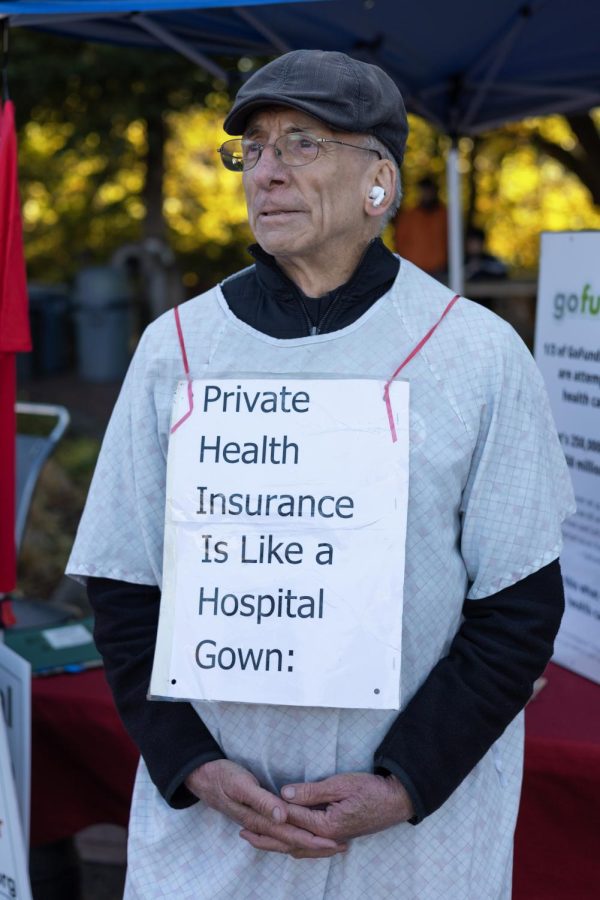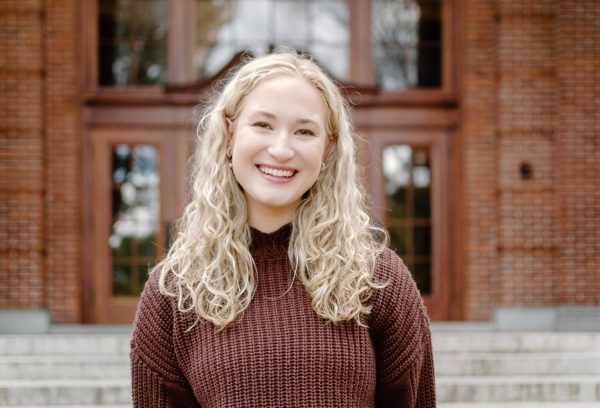Radiation Oncologist Joins multiple Movements for Single-Payer Healthcare
November 3, 2022
“There are many students and older people like us, like me, that are deeply aware of the flaws and unfairness in our system.”
Dr. Mike Huntington is a retired radiation oncologist and Corvallis resident, currently advocating for single-payer national healthcare to provide equal access to medical care in the United States no matter the income, age or status.
Huntington grew up in a family of five in Ontario, California. His parents attended Oregon State University where they met. His dad became a pharmacist, introducing Huntington to the world of medicine.
His mom and dad opened a corner drugstore in their town, and Huntington’s first impression of helping others originated from watching his dad work his magic with patients.
“I saw how much pleasure he got out of helping people, and I saw how he did it. He did it in a way that calmed people down,” Huntington said. “They might have been angry or scared or whatever. And within a few minutes, he had this natural way of making them feel at ease and even smiling.”
Huntington was exposed to working physicians growing up watching his parents run the drugstore, and by middle school Huntington had decided he wanted to become a doctor. He attended OSU and Oregon Health Sciences University, graduating in 1967.
After exploring his options, Huntington landed on radiation oncology, a narrow specialty that allowed him to pursue his love of physics, tackle the mysteries of cancer and build relationships with patients.
Huntington worked as a radiation oncologist for 32 years, 7 years in Billings, MT and 3three years in Medford, before landing in Corvallis where he worked for 22 years, becoming the director of the Samaritan Regional Cancer Center helping people battle cancer.
Now retired, Huntington advocates for single-payer national healthcare in the United States. He’s currently the Vice Chair of Mid-Valley Health Care Advocates, Secretary Treasurer of Healthcare for All Oregon, and Secretary of One Payer States, all of which campaign for single-payer.
These organizations are run by healthcare workers and are part of the movement toward single-payer healthcare.
Toward the end of his career, Huntington noticed that although the detection for cancer was becoming more technologically advanced, there was an increase in patients admitted with more advanced cancers.
Huntington realized the patients were worried about covering the expenses of medical care, and often waited until their cancer was too advanced to be treated effectively.
At that moment, Huntington realized his passion for single-payer national healthcare, which he believes can provide equal access to healthcare.
“Single-payer is basically shorthand for everybody pays something into one central pot. And all the payments to the doctors, nurses, hospitals come out of that pot. There are no middlemen. Now, in this system that we have, there’s hundreds of insurance companies,” Huntington said.
Canada has the closest model to the ideal single-payer that Huntington imagines for the U.S.
“Saskatchewan made it so that you would pay a tax — probably a hefty tax — so that you could go into the hospital and not have a bill when you came out, No matter how sick you were, how many procedures,” Huntington said.
Later on, other provinces followed suit and copied Saskatchewan’s healthcare system in Canada.
“The single-payer systems of almost all of the developed countries provides better care for more
people at lower cost than we do in the U.S.” Huntington said.
According to Huntington, today’s U.S. healthcare system is run by insurance companies — the middle men — that find ways not to cover their patients’ medical expenses.
In the U.S., healthcare is often tied to a job that also covers a spouse and children. When a person loses their job, they lose their insurance and the ability to pay medical expenses.
“[Insurance companies ask] how can we avoid ensuring that patient who has a history of diabetes, and it’s going to cost us a lot of money someday? So let’s figure out a way to avoid that patient. What a way to take care of people,” Huntington said.
Insurance companies call this concept a Medical Loss Ratio, which is the amount they lose when they actually provide health care for patients, Huntington said.
“[The insurance industry] is taking a fifth of our economy and it’s discouraging people from becoming entrepreneurs,” said Huntington.
Since many companies offer health benefits, many surrender dreams of opening their own business because they won’t possess adequate healthcare insurance.
For new and aspiring advocates of single-payer healthcare, Huntington suggests simply conversing with others in the community about what the healthcare system could look like in the U.S.
There are ways to contact local legislators by way of letters, emails, and phone calls.
According to Huntington, MVHCA always welcomes new members, and any OSU student or Corvallis citizen can get involved.
As Nov. 8 approaches— election day— MVHCA asks that everyone contacts their U.S. representatives and senators to remind them that, “Now is the time for people to have the nation stop wasting its dollars on outrageous insurance prices and skyrocketing pharmaceutical costs that give poor health results for Oregon.”
Measure 111 would add an amendment to the Oregon Constitution to equal access to affordable healthcare. If passed, Oregon would be the first state to establish affordable healthcare for its residents.
“It is time for a national universal single payer health system. Everybody In and Nobody Out,” said the MVHCA website.
According to Huntington, it’s important to stay hopeful and consider all the progress made in the U.S. in the past 200 years for movements that once seemed unrealistic and impossible.
“It’s not going to happen unless you have hope. It’s not going to happen unless you show up. And it’s not going to happen unless you speak up,” Huntington said.












































































































